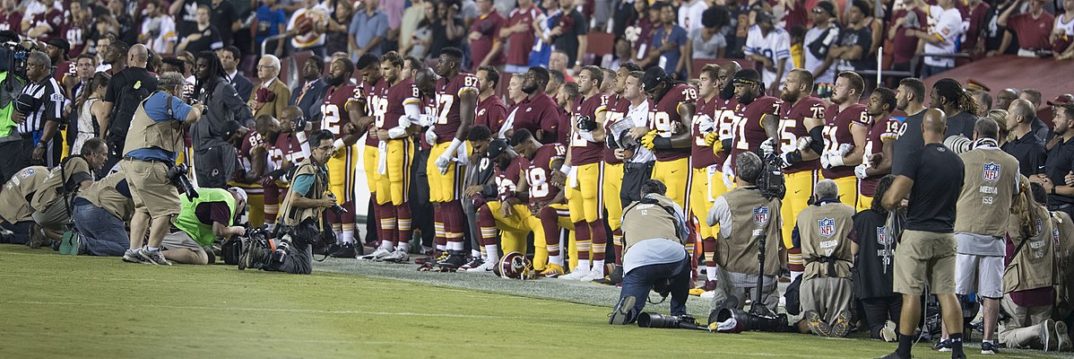More Than Just a Game: A Follow-Up
At an Alabama rally on September 22, President Donald Trump criticized the NFL and NFL team owners for not taking harsher action against players who protest during the playing of the national anthem at games. He is quoted referring to players who protest as “sons of bitches,” and claimed NFL owners should fire them for protesting. Trump also called out NFL fans, adding that if they would “leave the stadium” in the event of a protest, then “things would stop.”
Trump’s comments evoked mixed reactions from NFL owners, players, and fans. A recent CNN poll reports that 49 percent of Americans say players are doing the wrong thing by protesting the national anthem, while 43 percent say they’re doing the right thing. These results are strongly divided by race and partisanship. As far as players go, a report by The Associated Press holds that more than 200 NFL players protested the national anthem the weekend following Trump’s comments, which is approximately one out of every eight players in the entire NFL. This is compared to just six players who protested the anthem the week before.
Almost every NFL team owner has either denounced Trump for his comments, or held silence. But perhaps the most notable reaction to Trump’s scorning of NFL protestors was that of Dallas Cowboys owner and friend of Trump, Jerry Jones. Jones, along with Cowboys players and staff, took a knee in the center of the field before the Sept. 23 game against the Arizona Cardinals prior to the unfurling of the flag. They then stood together on the sidelines during the playing of the national anthem.
The NFL team executives’ sudden integrity, however, should not be accepted at face value. Why is it that team owners are choosing this moment to share their opinions on national anthem protests that have been occurring for over a year? Have people forgotten that these are the same executives who still refuse to sign Colin Kaepernick, the original player to protest the anthem last season?
While integrity for the sport reigns supreme in the minds of some, the NFL and NFL teams remain franchises at their core. NFL team executives refuse to sign Kaepernick for the same reason they refuse to fire their star players for protesting the national anthem: it’s bad for business. Trump’s comments espoused a movement of previous NFL fans who are boycotting games and NFL merchandise, and are even burning their season tickets. While NFL executives could previously choose to express or not express their opinions on anthem protests, Trump has now forced an ultimatum in which they must choose to side with their players and sacrifice a large portion of their fan base, or side with Trump and sacrifice some of their players. Neither choice, however, seems to have a positive outcome for their franchises.
Meanwhile, NFL players seem to be faced with their own ultimatum: to protest or not to protest. Trump’s statements have put players in a polarizing position, as players are now protesting not only for racial equality, but also for their very right to protest. Denver Broncos linebacker Von Miller said after he protested the anthem on September 24, “We felt like President Trump’s speech was an assault on our most cherished right, freedom of speech.”
Even Alejandro Villanueva, tackle for the Pittsburgh Steelers, claimed to have regrets about standing outside for the national anthem during a game on Sept. 24, while the rest of his team remained in the locker room. Villanueva, an ex-Army Ranger and graduate of West Point, said of his and his team’s actions on game day, “Unfortunately, I threw [my teammates] under the bus, unintentionally…We as a team tried to figure it out. Obviously, we butchered it…I’m not going to pretend I have some kind of righteous voice.” Steelers coach Mike Tomlin asserted that he opted to keep his players in the locker room during the playing of the national anthem to “remove ourselves from the circumstance. People shouldn’t have to choose. If a guy wants to go about his normal business and participate in the anthem, he shouldn’t be forced to choose sides.” Tomlin’s reaction to national anthem protests displays the increasing divisiveness of the situation.
While executives and players are trying to navigate a politicized sports atmosphere, NFL fans are dealing with a different tone of ethical dilemmas. In line with NFL boycotts, the NFL fan base is predominantly white, conservative, and more likely to oppose anthem protests. However, Americans on a grander scale are more divided on the issue, as evidenced in the protest opinion CNN poll mentioned previously. The debate among Americans surrounding anthem protests seems to center around patriotism, First Amendment rights, and respect for military rather than the issues of racial oppression which players are protesting for. In a letter to the editor for Washington Post, William Romoser of Fort Valley, Virginia wrote, “The league must apologize to every veteran and patriot and immediately start showing the appropriate respect to flag and country again.” In a different letter, Anne R. Buttenheim of Frederick, Maryland presents an alternative view: “[NFL players’] actions demonstrated respect for what the flag represents: the Constitution, the order it establishes and the rights it guarantees.”
Kaepernick began protesting the national anthem at the beginning of the 2016 NFL season to start “real conversations [about issues of racial oppression] that are uncomfortable for a lot of people.” With President Trump’s comments and the national discourse that followed, Kaepernick seems to have instead started conversations over respect for the flag and the rights of protestors in which the middle ground is quickly shrinking.





